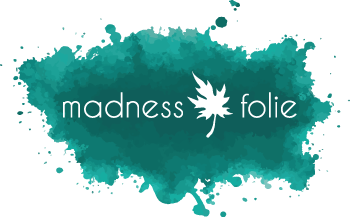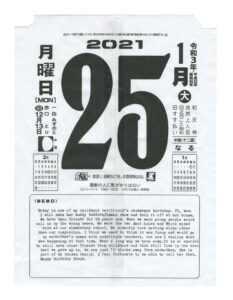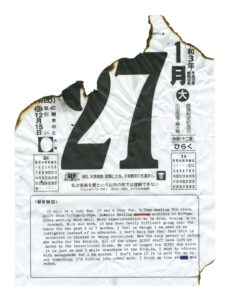 Component Exploration – the “days”
Component Exploration – the “days”
Timing: 30 Minutes
Mode: In-Class; Online
River is a queer trans youth who identifies as white and racialized. Their component presented is the art piece “days.” The second component is a set focus group and interview excerpts which include River’s explanation of how they created the piece, and their thoughts of alternatives in mental health, the struggles of being trans, and the stereotypes they face as a racialized gender nonconforming mad person.
Work through River’s sensitive artistic exploration of these themes by observing and considering the “days” alongside a careful read of their interview and focus group excepts.
Interview Excerpts:
In a focus group interview, River describes their inspiration for ‘days’: (edited from original):
“So, I have a tearaway calendar by my desk and it has all the days of the year and I’ve kind of tried to use the calendar as a journal, because there is a little memo section to write in and I’ve been utilizing my typewriter because I kind of neglected my typewriter for a lot of time and this is the perfect opportunity to use it. And this project is kind of a log of how my days go. For example, what you see [here are] the seven pages of a week in January of me just logging what’s going on for me in terms of my mental health, as well as other aspects of my life, and then manipulating the pages how I see fit, depending on what’s going on.
For example, for the 27th of January, I was talking about burnout when I was working at a nonprofit…as a support worker. I was there for three years, and burnout is really real in that sector. So,I [am] literally burning the paper. I’m highlighting certain things that feel important to me and blacking out things that are for, I guess, for confidentiality (I’m not going to put my therapist’s name out there, or like the organization that was working there just for privacy purposes).
In this last page I wrote about – content warning – racism, whiteness, white mothers. Yeah, so in this last piece I just had gotten into an argument with my mom and thinking about and talking about my whiteness as well as my Asian-ness and how they co-exist and dealing with what it means to be white and racialized and what it means to have white family members who don’t fully understand or don’t understand it at all really, due to their whiteness. And a lot of my work usually has to do with mental health and being mixed race. And I guess, by default, queerness and transness because I am queer and trans.”
In another interview, River describes the challenges of conforming to the demands of traditional mental health services, and their desire for alternative and more accessible therapeutic modalities:
“I was just talking to my therapist today about the Rorschach Inkblot Tests. [I was] thinking about diagnosis, and when you go in for an assessment and you’re expected to just open up your heart and your mind to a stranger for 30 minutes to an hour or longer. [H]ow can someone see me and diagnose me in an hour when they know nothing about me other than what I choose to tell them? And what if I don’t feel safe enough to tell them what it is that I feel or I’m experiencing? Perhaps…seeing the daily log of these things might help someone [a mental health professional] to better understand what’s going on. Whether that is through diagnosis or not, even if it’s through providing medication, whether it’s trying to figure out a care plan for somebody that could be in the form of just like “We need to figure out some programming for somebody to do, like art therapy or whatever”. Or “Maybe it would be beneficial for River to do like…whatever” – through reading these and seeing these [logs]. I love talk therapy, love it, but I don’t think it works for everybody. I think that there are times when I wish I could write my therapist an email instead of going to a session…. I think it would be helpful at times, an exchange of words in a different way. Potentially more accessible for folks.”
In this set of interview excerpts, River comments on the multiple stereotypes they grapple with as a racialized gender nonconforming mad person:
“I’m trans and gender non-conforming, gender diverse…. [T]hat’s a big part of me and my work and something that I think sometimes my mental health and mental illness kind of like aligns with, just the struggles of being like trans – not because it’s bad to be trans, obviously, but because of the way that the world treats trans folks. Depression and anxiety and obsessive-compulsive-like tendencies showed up when I was in middle school and have been with me since, as something that I am living with and is part of my life, my day-to-day.”
“I think being somebody who is racialized there’s [also] the effects of racism, whether it’s micro aggressions or something that’s macro, on a macro level…. I had a conversation about how representation is such a huge one and I think it’s loaded. Seeing mad or mentally ill or disabled like folks in the media, I feel like it’s either the stereotypes of like …crazy racialized folks who are mentally ill? And then on the flip side I see like white folks with mental health stuff, but [they’re] getting treatment.
So I think about that, and for me being somebody who is… also queer and mentally ill, I think there’s connotations with that, similar to to like when you’re trans but like people tend to (maybe less so now, it’s been a while since I came out, but I feel like around the time when I came out as queer and trans was around – 10 years ago? Maybe a little bit longer) still, you know, talk about conversion therapy. That still exists now, but I feel like it was maybe a bit more common 10 years ago. The fact that gender identity disorder was considered a mental illness – I have mixed feelings about that. I don’t think that it is a mental illness, but I think that a lot of like trans folks struggle with being mentally ill, but I don’t think they are hand in hand.”
“Even the word mad is new to me…. [O]bviously mad studies and mad people have existed. But it was always white folks claiming that [identity] and it didn’t register as something that could be mine. I even think of who the people are going into social work, or [who] have been in social work, have been in psychotherapy, and it’s generally a lot of white people, a lot of white women. I used to be a support worker at a nonprofit for to 2SLGBTQ youth facing homelessness or poverty or impoverished, and you know a lot of our participants, I think it was like more than 50% of our participants were BIPOC. I think it actually might have been even closer to 70%.”
River elaborates on the need for a more diverse and representative mental health system, especially access to more 2SQTBIPOC mental health professionals:
“I’ve been in therapy or counseling for… probably like 13 years I would say, on and off for 13 years.
Whether you’re a teen or you’re in your 20s, you’re around people literally in like lab coats, essentially. You know? The stereotypical – like what doctors or mental health professionals wear. I remember there was a lot of gaslighting for much of it. I talk openly about my experience going to a gender identity clinic in Toronto and…I don’t want to say that it was traumatic. But I do want to say that there was harm caused, and there was gaslighting that happened. A lot of telling me how I should be and who I am based on the way that I look or the way that I present myself. Essentially the conversation of “trans enough” was the issue. Like “Are you sure that you are trans enough because “I see fluidity in you.”
Yeah that’s a little bit of my experience with the early years of mental health professionals. In the past three years, I’ve been with the same therapist and she’s a woman of color and she’s great. I am really grateful to be able to have mental health support and I’m also fortunate enough to be able to pay for it too. Because I know access is a huge piece when it comes to mental health support.”
“I think my mind goes to anti oppressive and anti-racist workshops – how that is something that should at least be an annual thing at the very minimum, the minimum folks are doing and learning about certain populations, especially if they do not belong to certain communities. I think learning more about trans people, gender diverse people, intersex people [is so important]. Since we’re talking about a Western perspective, maybe learning about Eastern medicine as well. There are other ways to incorporate healing and care, other than you know our Western ideas of medicine.
I would love it if more doctors knew more about trans bodies. I had an experience with a doctor, and I forget what it was that I brought up, but the doctor said “Oh, I have other trans patients”. But it’s like “Okay. I’m glad. What does that have to do with me? And also how many? Like when you say you have other trans patients do you mean like two other people?” My hope is for more – if they have the capacity – for more 2SQTBIPOC folks to hopefully join the healthcare and mental health profession.”









 Français
Français